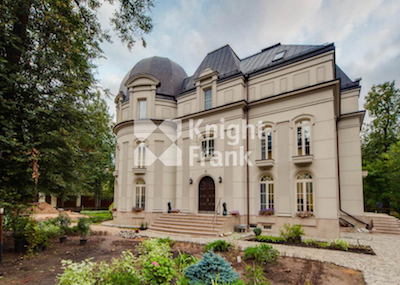Prime residential rents across the globe fell by 1.1 percent in 2015, according to a new report by Knight Frank.
The findings in Knight Frank’s "Prime Global Rental Index,” which tracks luxury rental rates in 17 cities, defined as the top 5 percent in each market, stand in stark contrast to the 2.5 percent growth in 2014. With the economy once again entering a period of uncertainty due to low oil prices and China’s economic slowdown, it could be a bumpy ride moving forward.
"Lower commodity prices, tepid equity markets and slowing global growth may lead to lower rates of growth in prime rental markets in the short run," said Taimur Khan, senior analyst at Knight Frank. "The combined effective of the aforementioned factors is likely to lead to reduced demand from a significant source; corporate firms where budgets for prime rental properties are likely to be reduced.
"Should the dollar strengthen further then we expect foreign demand in the luxury residential sales market will weaken but in terms of the prime rental market, if the strengthening dollar is as a result of an interest rate rise we may see landlords either increasing rents to cover their higher mortgage costs or choose to sell, reducing supply and thereby putting further upward pressure on rents," he said.
Rollin' and tumblin'
The performance of each city is linked to local employment markets and especially the professional services sector, but larger macroeconomic factors also play a role. Knight Frank cites unimpressive performance in equity markets and low commodity prices as contributing factors to the global index’s slowdown in prime rents.

144 Duane Street, New York rental
On a regional level, North America was the strongest market, with an increase of 2.8 percent. Toronto and New York, the two cities tracked for the Index, had the third and fourth best performances in the market.
Guangzhou, China and Tokyo, with growth of 5.3 and 3.3 percent, respectively, were the fastest growing markets and helped buoy the APAC region to slight positive growth. However, a fall of 3.8 percent in Singapore, as well as more modest falls in Beijing and Hong Kong, limited regional growth to just 0.6 percent.
Nairobi, Kenya, experienced a big slowdown of 5.1 percent, with Cape Town, South Africa, the other African city in the index, having modest gains of 1.6 percent. Tel Aviv, Israel, the only Middle Eastern city, fell by just shy of a percentage point.

Knight Frank Cape Town rental
The worst news, however, is for Europe, where overall growth was -3.1 percent. Strong supply in Geneva led to a drop of more than 7 percentage points, the largest on the index. Last year’s biggest faller, Moscow, had another weak turnout with a 6.5 percent fall. Only London, at 0.7 percent, had positive growth in the region.
Europe’s poor performance was in part a response to Greece’s crisis, which nearly caused it to leave the European Union, but the upcoming “Brexit” referendum is posing similar issues. Business activity in Europe has reached a 13 month low, and the economic impact of Britain’s exit of the EU could be vast.

Moscow rental
On the upside, some of the cities that were hit hard from the 12-month period of December 2014 to December 2015 that the report covers may be showing signs of a slight rebound. Moscow grew by 15 percent from June 2015 to December 2015 and 8 percent from September to December, with Beijing and Tel Aviv also experiencing positive growth over the half-year and quarter.
Long-term outlook
The possibility of the UK exiting the European Union is already affecting London’s real estate negatively, even despite the growth of rental rates in 2015.
London real estate growth has fallen more than half a percentage point over the past six months for the biggest decline since June 2009, according to a recent report by Knight Frank.
Prices fell by 0.1 percent in February compared to the previous month, and growth was slowest in neighborhoods with more expensive property, such as Westminster and the Royal Borough of Kensington and Chelsea. Like everywhere else, market volatility has potential buyers on edge, and the impending European Union referendum further complicates the market (see story).
Over the long-term, real estate will likely continue to be a good investment.
Despite stock market volatility, geopolitical instability and new regulations, prime residential real estate still has a good outlook, according to panelists speaking at a presentation of Douglas Elliman and Knight Frank’s The Wealth Report 2016.
Oil prices have plummeted, governments and the IMF are tracking the flow and origin of incoming money and many assets have had negligible appreciation in the past year. Nevertheless, looks at recent history and wealth projections show that a bet on long-term growth and on real estate, as well as classic cars, is a safe one (see story).
"The lower rates of growth seen are more as a result of current market conditions rather than as a correction to more significant growth rates seen historically, primarily due to the slowdown in the global economy," Mr. Khan said. "More so favorable market conditions for buyers, in certain markets, with historically low financing costs have caused a fall in prime rents over the last year."
{"ct":"qQmyP+HIU58zG3xRYIkhJoOw+B8QTQ32KVefppA9p0zFrU2I9SghJbWAQN1\/bGZnKrSTwsvuCQmWes6MuZSMkeOB8JDDZTaAiKOR3Kd7xMi69LuZooucXcof7KENmPlCat5NaBgNuOOfso3vP6z00m8rrFqNU6e\/u8tqyNf1qfceXxR8pCsYH9lhrl8F+rUspb4qN74FXQUjMzoTcURUoFmRFZqOkhNSwxADckJE7IuBzhKFT0fWK5ElIKYM5zKxNKM5qTEPFrxWMLJV89dbNokIBn1cvBarEJuNz5TWHTpGs9o1\/oPYWv+y1YZcjoKz31fTfQhuidqh616Mq3\/1QhtN9bWKuXeGJ8\/6Q6cdjaWCoqMHWe89tdNy+rfPatsTPU2jeyhGYXzhBxsdFWV9N5FkvaBzMw\/uhD7TUWzN9U6uPb0bDCzoIXblb3FlsXAMU2PlVaFWUW00l85ZtYfJN\/oTxytTC0yuhgaAYHMtrJ05eBVx1J8MWpM3GSTrvCp7pOtAC3bk1FMZCkG84o4QxSifxt5atyC86uRTfVETuh0MIZwjuaLbSt7BRqxNFdJddbUlDbXRJeUK4FNwOPBQHCl0bX7+fxysnSmusilVQgE2\/17OqQ5lzTHqm2yCoQxm2EQo\/f6JVTzRTjr2v83xLMeJiU\/P60UrTk\/YW8i\/PiC4lXlw4ObYBCFzUr8Nzh7pg3SqRsD\/waCvUnkJAuBntdiN+WCqIRuBWa66Yl92MlOq5n0U8x1B5wKIar4Rm\/oTWMar+\/QuqhJZDFB4U0KddOX3FcSDUNEZGjTnEDxPvopZkxlOKmguV+eFZSud6C6CVKkol+pLkOH3LXdNw6+9anXrswDfMiuwIe09TxA0sXehzBLCUns54LA7+4ZhFNbcM8qEVvuGgjI+zm3T\/meJPa0vW4aNK3E7UxnZSjrS0QO0OvZANEKuR8tiWueoImtzuTQdfrBnASWww3ozm3Ta1C3CsLX775rVdKZrxeC82oQsv5bPeMjuOngqoNvB3wPmPz\/6RFGF8jdr3lFDEHhoTQJss+M+3uGPUYgxUpyiKk8KobY6YmEm\/UifLV2HFPlATYPNsNeMak0wTjPAWDSUwkwZ8ras9xMBC6zIWdNqM6Ll82BNWw\/fX\/eK88jZ2bp7JjSIpoiRB6lSlCgjWrgPqW8SMMQnKFntHtqVpPR95PCc4h+sl+8lZeaCbtFYmk8nBuyCsh+F1qdoPh+9untfh+zaLRwm8Qoiv9OtMJiAeKiiLsE7WFAqdisCR7yPra05dxd3sGnYKJwfhszdyuodPiWrZ3BzWDvwel9ztUdLck5MXH60FF9MUfA8HYA2uQDCLqykUDiH2WHhD8PTvS\/lIgRYymV+JG+e2LWHt5\/iTsbycmKrJywhN5qLfb9Q5qnNf0KBdyQo3gQB\/OzZL22NzlhTErUFu17BP1qTdx\/vpneb8yYz3bEEBTkVo3cSk76VdVkvrWfaEzY5GS3RCtW7L10UcKHortf8M3oNWalxpmZb+TMJXZeWU9D4G7PvqARfzl3yAcIPz\/VMhihl1mJCsmRoANJtRcJsQjAf87XVwfJpvN6UcK+mM7c3cw0X\/wtbA66ueWL61u7rW1kTT90V+38ovunX0OihbQnOdpDQfvV311kGMLwIia\/nyjsDsfNs1j2bC14UQbO8yvfIzwC7qYKC3eCfFv5Z\/agWqOrh1TF6xU+UD9pEH95Gt9WDTmAVI\/GFUYIcZJWXdjXQQ+HdSwHMjwNx1fEF3\/XRiCVa34XZefKsd\/8t88G8VteNwZ+CXit0wW05sBnxsfG2ojEshClTcs\/IrMbq6SKHsvI7OaM5OfS7pJ4rsstZr61CL7y0yBpH4seMrDqp2jxKzmjJbM3IUii8PnGhYDOQCWPYM9lkQYKUT8ICbNCFcqtXKXBmZx0v6CQ1XecPSzewnt+ovc1qPjsbC0t7AWaV55qZune+VSynjLBDWyWiPRu+ZE8YWN7+UzrkzT+yl7evaxrGGasEj18h\/5U3FCC6dSHKyMPxhrlC3PvMDkSiF1FPAzEslu58KFMfl7mNBR2kVQShZcvINeg2Cq8gYiltNUOVMJztBLSE9bo43CD1DcJ0Ye+BPWdAldvD0VtKgstN1jKq2ABvagaiaVmf0aorpjDWdxYeSMcndIYfOQENwm33ZHyRpd6lJ\/tWsrPumXKx\/flKpV8Oc9OwdAnDQj2MTvAdO6QTGE8T63Ngse50ckK1gqnBIVL+YAKs+O63yBcqFEqBH0Oab9b+PHfv49QDh7TJ6QPp389vMf4\/vAktthJG097Zr2PS7hTAl8m0UZ8m55Fjn\/stnp0LPKQ6l6BCHk+UtpL0sVPKuOdv5l88w0uVnKlFFcnVx5gzCqJWXx6GHlx\/wtX1te4Ma4OPg5Cm7D5lKShn8Ri3dDbiG8moff6\/4+017j1DDFu7nM2NMasmDsrGC5fDzpFfOLqCSRw8aV\/dOnN7IKYBpsyjOyWnPpt9ccRyhL8ZWJVgUICqOmYjnNqrgOKqzr427F5N4dPjcnMD\/63f8beEUCGw0kvjNrx+oFxgCuVuUmkE1Kjc7lKBEy14SAkQ09TbTTk\/YJv3LMneh8qn7b3rRhQgaiDIjtICrylBWKCDmxzxyjUVqQVzA5g9ue45hWSm9K1qeE8dDOrcCcSfaoh5y7WJN2yDGtJggP99inC8VOk9ReeKBt+V54V6YwUFWkkjxclp3Nebshwx4fZjwU41ZmBIiE5wGW1nWhGZBTyg3HGzWwB3WiRfXWxU2v1j0iIa0wgJev4hripD+9hqxub\/G1jf4bQvvf+pQGWTW+5NvN\/WGQIW8G+yLZmVJWpp5oCpuoAlhsKVTSu+vADoDZLBisRrc0ShC6Q9CIV6TfF7LVViO7Z8vISCpTfN0uqwCzjQ3oqehTrWbpl\/ifF5fKn7h+zKZhTIURfNV+Y0izSPQlTcz5blNV9a3\/v75+P6RklpnNp0rYSX1YcYRhHi5bByX4xo22yT3xGYrxLxp7aTkiUmV\/bbDxveE1KGFCbYTn12iws\/9n839s5jc+atEj45SDilHAJ418zICQCAGBUj1HRsm5AgxrIE3311UDSbCrRH5ae+5\/14vfG7ctcXD+LtDkZWtLs152eheZ3Pr+W6Hop9lLcvwpusXPvBHdcvZ9Y8RvHRV1kfv6b7Xs15JK7oBQ9dlhJF0mVTd6ZIab+W+r62Uqm9XOozNcZYufStURxTAJKsaC6FIPpo+zaoP6HFeh31bG9EC6z3DvcZer8qeIiweU5k+g9MTGouOs+FHGDmgYA37dgDpVcFu1VVihcWffvwV+duFVQNr1VDAIFYReLar7uXNmbuZhULY0qxoXNf4kKLeehATQBH1mxXN\/Qf1zaRtkxsgOgg071LNvRczYcgQ+9rSf9wclLp19Mh+rWKnebAEYNWSGqtQS98W4QPekbawiutcwjGxNbq56XyzKFkHtVG71k7lOYtdlMYtRET2ld\/Lcs8njhSM7LDq423xWhLMG39MXEy+1d67k9zxdaRWORp2CL21AvGd9wC0PxzgueceDUEnpl7G9HxBaVKbmLZ0q78OuNPQ1G3eXAy3Fs7jqg+84sJuPrVDCIVQHvGZyonCk\/l2k+S4iM\/0HpHESOpShZVA9ibI\/GgLgSeJSaFO7fUk1YwFiJxEEz4JvMea1maGlBeeAbNqNLE5MxJ3bPKxWpYFiTybCwYx9pJNgqZZ+jOrT5bVvNSoVXZ0ZrappEu8OD9CWdK4mqEwAZSYYLeXUo8tFQhuf4pg0wFmxDXfNkh4DPFFS9lc8GWNnLuLj9KrIbZPRaALXG8W4Z\/pKJ39Q4NAosS2iW2pZF1AOh1oiEmilJpvFTfa+ZjH+uypp\/9XbVdE+EB+DM\/dSTicBzg9z7luKSTz3OcRVwgJm4gKpQl9Qm8HMGzudJnazceiOyrnTejUWRywn1Pwj7Hn3zlwEBkfkDGpVnru5lxsb9UhSmAXMxzyyy04n0yg4gC8UG1HefFaatOihLvv\/b8epLi\/fbtqYYr0P03fDGJZHtr4x24PsnBgoVI3gyPWMiTPpcnwba9gg7u4gwwyoErqDgqX0r+6aozR6z0wVTqvzUm1AZ3H2NhWI5xeBa\/IumvrFevRYDMmF+DoI4xzcVpzCIXPZJYbZ30iMH\/DKvAQyzOeBS0AmJACNMdiGuy13NOa6mVMtDHU9ZMoLK6YjHz9Tg8dEd2S8YyK4JzvHE5VCc11yBD97xMkHDHKvNHFQ3NKCmy9ep9+vGr\/+JSmqT9XjNWG7I2Jt+jhG8LzUPpndZUaDI4o+SKOS2gqGsAnNwhs1FJLKtFlBOOuNrPJz2jcV9pg+IMytSZML3kRSYgYZEWqfANE0r1tjYdMEjnZRzS5p6Tddw7o1YMhY2K1+JfLgMfULre\/E4Am3JFFjTnJvVcneZ+AYD8dEa7a0e26AfdCIhxjeQ3+WlqUnMu\/G5CYYJeFzycDr6Rv27w0NjLJ8kzHkRQ0Bk3sDn9Den27MnWDvommcsc2OJl4HVa2uKNfFr+iFyF7dbLnQ1leWQanMYVjwdllNQZqxZiKzpATSBbuUUHixbE6QEkCqIFikgLugsa+KQWunWWsv8685OhlzuGYGL9GJSLycxruefwgT0DUzNxlUe9hSavguPT1OP6CEOYeA+q32af0ysnNl+VKC9j7mLHtFfks0AgxK8KsPLou10BoX7uKL\/Fhq+8EHd0jPpL\/oc0R8n7vSKIEVU\/a7ScseSo76cYNi+vo7EqV+A0YOesVe5uY1Nn4CcoUV93zivX7NGMcENTiwfOQDS1FNpVAO1NN60aahUXKU882rNZLiPbLFXVU0mVUbtfIYO0420tSYZmPj+CqXawtyKOJXdCk+ZOGgKCehYsDcdT8nkvWp7aG0L5x7n1IWGLP969IawlvTgGwtDNAAdAQ3CwYcRY5D4YzybdAq1hYGoJJYiP1+Q27VeJ8RVN2SgEb2dEYy6uDNJI\/PIeHecOoGi+puiazhd+yN2KeHxaawFxMDcurVPW1vv6mWJslcbB2VeXtFj0kjVhatwYIXoVA5IwaaG7Hej1XAnzZYM+scQqzf8EBMqjV1k5Lov\/J7DjIkc6j\/fLDs5v258H2ytFcWk6A5M7srpXpCDyU253ljMVpmi6kYr6mIrSJ3nyMklAiP8jhikzca97LN68cKPuH0BZ3tcSrTNqpJF9SjKjPhlQfGNIuE7tUPo9INAnDYLWyu1LJHHuWCaxWuRzGcccQuSuaBukvY\/lSdCzsEpei9PRA4APHP4jk0PvNg+VIHSTkFpLwET2wndoWKK1ACWkkBW5Pw8QYUYCq+J6SE8aOGSVkEwKqvWm9opDkkeBXrNYOfyuX7hzEQ7BngI8669g86aiV6+4Ojj2QcpvQnd7Tq00RMjPkr60pOzQNDMZudukwfdoMFGAZc16UkIaPN2rs5X9NZ3LTx0O4YJS1Plne1\/7hXl6yyVMrePcOUFa8nPbs4Kq4pUrcGcKCQt6u\/BzbknPqtpBbK44QtAVUvI4Dd7bBJu6hHwM196MBrZlvJiHoctMgXy0f0Dj5Fna2E6F4X2kvqwmgdJR9lAXcIlM\/hbbKhc9ptMZHXYZAI5nKpV5q6khY32TAAdWzXnhFvkjWikXNFHqyG2BFZlV03JeUBFjyU4C3JnBcD+Ni\/BiDy9YMyW8z7Thwxgd7zAuRCsJ9l5fy+5mqND0VcJPo8yIlj5IwsG61YCWywDx09nN9UZDjCWUFZymCpF1z3+l+4XS+y\/LjZzFcD\/K1H+8Dfe9aMW5s7ddPk5viHjZ4QP71WbAYhMY3ERt8AFz6wcEr\/YAFsV6dkSD9ANlPjwqoCijeOGsYMFr26KKqHsSI\/xjsD+88zckK\/FKCIbOhR63\/gkJvh+\/2dqp\/3wWGCBzshjALD00I\/ibmBskQoHDHjR1DwT7RLZdmWa5SigBbVIWCvP8ZQv4G9xuMBSCVDGmdrgqMB0N1MbBal\/yxOt\/ikkStl\/TkDOg6i+jrLBpmFcguavXGGEglygzBsBejWqoYpUk6j4qtK\/3JdXHEa\/zfy5s2WSCQUHAoslhW9HC7nlWe2aSfPPADZ0gLq32uuklXGJWeGbMlLBnZGu+3z+atS+JgTJG2LTkuBxjIim+5UIaPlXHLPUjobSFgad4U6WJkQwSIvtJxlCGMIfziZvSpkIEphwFXsc\/DXHdJM+xhooU2R+nWZDHTWY1F0pOQ6WR+OypSciCHruQMS1bMZ+ztFPmzaEUn9h8uQqqYq0dSqp8v2Su4JCF1VU96mcyeIOZdxgcvTyxKaso899cxs6rsqI+xNW1\/OjJi\/YCRZP0aAmaY8bROXi\/62V1Q4qVp0hrregRYRN\/r0+HkRTc7Ph+hg6xJFDLH5AKqdLodZkrqOc3vtkBqD4nfl1QsPAVFovZ3gMLofAO2nnhO46q3oraWyQyIIZMYvSBNwdsojr5N3PYhqK6XXr4Wa0fu3Qrg8aV3oswi1wpSmjlKSILn8jBbfmvLJHUGtzlvrySjjtBVfIkIylCbl0EpZ8xC7Rb7RNCQ0bnJhpgPVpapFUOI2nX8MP2fEUH4aOT\/Oi0PCWRfU2xRl2b8vtENUYu6Zp6044tFq95LLxTXeBZlElRBEz0iTr\/7MHVbuUYy5\/pMtJboUbfeQtHGzonydllPQCxZteNoPbcSXS63XfrGGzKPKzUCGzMsu561X6fQD3xnVaT13TTR6bIVlhd4dmFR+u9SvbJ3xmvw7z8qbErKtr9NhTSdRH54gAWhHBd06raajZsBGZQIafgfRrgYTMSJk6fMhgTAzcUAO0m5NxNNCZ\/4E\/e+bU3hhcAMpfqLOoBR\/NGevOongckx8E4GRztLGyVlB6tq\/l95dobZ48GaEjNP85baKpZ1ezz7zaB0L32k\/bCjDWAJlX6J40yiFSRsaggRDTfXQv8eLpT5DaiqZYtdZQxfeDtlzwLc1XcjBx4zQwKaaypdGYO7Xrl40Me6KfRvZG9Gx69aEplSR3TjXR64rVBodap9S0XTbyrSTaq4rFadN1ebAGgbE7zreWOVWg\/kHO+MqHE+Z2i8dr9dVAPwMqLTiQyHlbz6OXKTht6RPLw2wFioL5SSxzCxHW16GF8a4e2kIkYMJ3MbUSv6Tjm+cpd1jjwPWIPD10gMo\/bKDdvMh+uj10WDYloe493QseGjd2QOUWkVJDlTpZ83dNvSJl+faLO9\/pZNGkpDJ4T5YGNdjDrOgr\/wqApmiDGea0Jl+zDXgKVzC0BNz3I6oLa2Nu9cTXVc\/0CeoCIjFLt0LvenhNb\/NFQ5\/bD65BJPZTcF3HdTdnoP67wLAwfDiZRJmRokuwoAsexJ0YPMPR6MNE6Io1PMTbXM2ma2Gg2OfS9OCJSCfYMzUsVZmyA9EQBj4\/GBqBMtU\/KaqYgv+rUHsv6UH5R7Rv2tSe1tf7lkyWbxVTCR40lqAZ4IaUiyEX8k+CHb\/1CoCeGn4IrUpI3XOwEdnjZQEj06cw3L4HH31JKn6bcDXg9\/EfnjHOZm7NSmu3hGGnBrwUajUetgaFNbEBSTzV98tc\/q\/jIWyfWL08fFcd0MRWaEY82iTDPVU7HVSgA69sgVKd\/ndEekgyHmKyxw\/Y4dMNzvJLiIg1dYZ4MZoobLYIw0RXQR0vALm4afDiRKjkjPyRF0rJXPnaEKa9+BJy7zDAzAFc3oSe4bjRaGNmAiPQRyRb6ygEVfjkXgvM2SFLXMCBCj1WqAVCNgyz2GUbvWkIuTERblHkcpcqz8WALgBIFLVr+ImJul2YxRugBKFX981u87dDmwsE1To03N+2z9+RFyJCZ4B81wSSPz3uvpfENeL9XCYVT\/vGyeNUk0qFzIawihVjuq+3QbzMib7dV8Tp9hRvvJW9G8j1QMkIO1Yelg\/lJ0nrvBZ4T+QxePYwqIMU2YO50qO71QRwgHa2CII5fA891VaI1kud7BnPsaOyCng8US1qoP02KpP4WVwBZh3DvV0YHVyVlzSqtFNTCIcS8psrmVQU77jxRLzMbaG\/Fz1LEx2\/DrJ6rWV1ZkDlkxCjJOWq5MBRLJW7+baD4lyNO6yCOVIsrgH9c2LP4kXECgyza4IcxWxs4sQIwVY0BLwrpHF4OtA2guB23XrdzaBBXbY1ovM\/cagsHVOyKM715r0bOkmgLmZXCcelBUKVg0sY1i\/hdOOEicQbcpfXuaIFQ49q9mXjJamLOOW0qEfxRXKaQoyVSGUsqr4YHwGBqk3j62ka0BV5I9u8TyfwYUC05yzlYDLZc4ugjtLUXHm2tN2MA5+WPZW5SNCVg19m8zyhKCOBt4pMW9yToom1QjTMi6UMbXmmO2sKEbyaTyCmvMt5cf7N4RnczYfqA64fqdnn8iK1y0VoFRPopE0PgGcw9hoy4iEjrUSN3VLYjMFVhhnyYAzvlgpV+sUrWmtVVGubVl5B9NwxOEwl4RH2+QfYdgTUTUHatXkYkl9c6NAC7gAKDJc09nnvss6AUKMmkKba6PVo\/eEiRvjsv+pB+0REkLKupPr5N4QVMMey7bn3wetB3CVi7l4I6UeQFNQYEg4Pv8bcfAUAVhIrG3aLBcPTAOhsdVMYuyVohONZJQAOgl9kmDFual\/W4JXdR5z+0vITsisU2yHNsPX6vLwVMXn96WdPAY8ryQlIZGeNWlZj6imz8CyQJTY6BVfpRf9UzN7aFXPL3Akaz8GKDnxaUQwLz3u3WyfjJvn0+4aKjeMABKKaU6xfr0MQMab7cNHHUHvcyk4I6HRmqpP1k145uZEtPPLB9McRML+2ui7Qs3Pks\/8cgbH7E+nm9PXGFwL0xy5hFmjxgN+YEPsRvExYq9atdQXaH90xdOx4+cZUx2UKcUQIRUaAA6Uenk\/BElaxqbvP6MUbVY6WOjpP145PydJopXJcKsFjv+htovy4UUfLZXPaOJIfTa9zZYqkxB7ztHX\/GRiNtw35jWmVqbT4y8BqFpQt2v6dc5Rv8yuORqnUutGo8lQiugvspV2+CGkAoUwqVeRns4vx7RVIlxYP33tx\/zNZsGxerbm6cTfAEYT6ACceVejjIVed9AJqS0nk6XhmVU4w353QsvXVDqhomgQjivlUglcXPe6Q0AWaQLPSFq1EmqGXn9u9wINaEOaWsUlK2kThzqjzzXPMxIi16anTdxy1hC+TmOaosxvhTwiDSfudXzE8fDRGTQA9wZUZlUR1xYEhmsPzxK138cgoe3nDMTFRgsgYn3N7aJYd0aw7nhE8ltYOrEQWQxScZLMTt2rdJq21VAAt2fSoPAo1IvoogHx5vhH8YLf8ExyMMZtV3htFY7zKj7IGoA0QEUmpU16Zt+2vY\/p0bQ9nmiaLol704ojlHGMgFRJm68f1NfZmODhwYO\/w+DgTR83THheBAI4S6zmQFYv9aQDS8gu2xGnLfXGPlqhY+bB\/0Yk1f0XpJ+K5h54h2AZ0JqpcsDnsaxAutkYAkO\/bskUX+a2Fyqqm6UEX1PAIClpssOXMdV3XyPqVR4Tgi1oJ0vfdp\/Rcbg0ZrDxkIQ7j4SaHRvKSjfapORbwiD8ocmerQXRUy0uyINg0i4zTc9e\/SQgzx2LxiKw0fO6bFsMpsiH68d\/Vn2Tlf2eqZCYITMSFFInTJzDBR0+ohyaomFrJjgiLTZC1V77f6NEoq3J66bUnm3r6lPezOpTCB09GnzNxMaILd6I3mcekJtv3ebyec8EDr0K+1u\/1BJtrlQPnq9xjrsyEGUM21XE0HV+KfkBfDp\/kkbSD+TQ==","iv":"168f39791186cd769a51a743677c2f74","s":"0e745b1a22661edb"}
